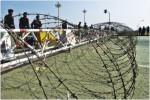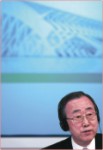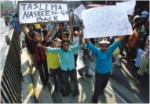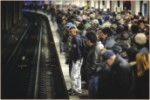
Inside
|
Month in review: International
Pakistan emergency Pakistan's Pervez Musharraf declares emergency rule on Nov 3 while awaiting a Supreme Court ruling on whether his re-election will stand. The Chief Justice is dismissed, thousands including lawyers and judges are beaten and arrested for protesting the emergency, Benazir Bhutto is placed under house arrest. As international pressure mounts, the government announces that general elections are to be held on Jan 8 2008, and a caretaker government is sworn in. On Nov 22 the newly purged Supreme Court dismisses the final legal challenge to Gen Musharraf's re-election, clearing the way for him to stand down as army chief and be sworn in as a civilian leader.
The UN's Intergovernmental Panel on Climate Change, that jointly won the Nobel Peace Prize in October, raises the tone of urgency with its latest report. Governments must do more to fight global warming, says UN Secretary-General Ban Ki-moon on Nov 17 warning that the damage already done to nature is already "as frightening as science fiction." Although the IPCC declares that its job is merely to describe the science of climate change, and not advocate policies, the new report is likely to be viewed as a call to arms ahead of important negotiations on a potential successor to the Kyoto Protocol. Signatories to the Kyoto treaty are meeting December in Bali, Indonesia. Indian army deployed after Kolkata riot
Troops are deployed in Kolkata after protests over controversial author Taslima Nasreen turned into riots. Demonstrators are also protesting the recent attacks on Muslims in Nandigram, West Bengal. Police using tear gas and baton charges are unable to control the crowds calling for Bangladeshi feminist writer Taslima Nasreen to leave India. Rioters block roads and set cars alight. At least 45 people are hurt and more than 100 arrested. Shortly after, Nasreen is transported to the Indian capital Delhi for her safety.
Oil scales record highs, nearing $100 a barrel Oil prices reach unprecedented highs, surging toward $100 a barrel, the most recent peak being above $99 on Nov 21. The surge is triggered by various worldwide tensions, including those between Turkey and Kurdish separatists based in northern Iraq, with fears that the dispute may threaten oil output in the region. Tehran's defiant stand on nuclear power also sparks US concerns Iran could use its oil supplies as a bargaining chip in any future showdown. Violence in Afghanistan, the Yemen and Nigeria's largest oil-producing region also serve to inflate prices, as does the weak dollar, which itself slumps to record lows in November. Oil prices have risen 40 percent since the start of the year.
Khmer Rouge jailer in court's first public hearing Chief Khmer Rouge interrogator Duch appears before the UN-backed "Killing Fields" tribunal on Nov 20, the first public appearance by a senior Pol Pot cadre at the court investigating Cambodia's genocide -- one of the 20th century's darkest chapters. The former commandant of the S-21 interrogation centre stands in dock during a televised bail hearing, at the joint court set up to prosecute "those most responsible" for the 1975-79 Khmer Rouge reign of terror. His appearance is a significant step for the tribunal, officials say, after a decade of delays caused by legal wrangling.
US screenwriters' strike cripples entertainment industry Striking Hollywood screenwriters say they will re-open negotiations with their studios on Nov 26 to demand a bigger share of profits from DVD and internet sales. They are to be the first contract talks since the strike began on Nov 5. The strike action cripples US TV, forcing talk shows to be suspended and threatening favourite primetime series. Shows like Desperate Housewives, Lost and Grey's Anatomy are reported to be on the verge of shutting down production, with no scripts for their actors. The writers say they will stay on strike until a deal is agreed.
Japan fingerprints foreigners as 'anti-terror' move Japan begins fingerprinting foreigners entering the country on Nov 20 in an anti-terrorism policy that has sparked complaints from human right activists, business travelers and long-term residents. Immigration officials say the biggest objective is to prevent terrorism. Critics, however, say the new procedures reflect a deeply entrenched view in Japan of foreigners as more likely to commit crimes and plays down the possibility of home-grown terrorism.
Nationwide French strikes, protests challenge Sarkozy |







